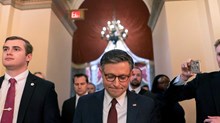A majority of Americans want religious institutions to keep out of political matters, a survey by the Pew Forum on Religion & Public Life shows.
For a full decade, majorities of Americans voiced support for religious institutions speaking out on social and political issues, but the survey found that a narrow majority (52 percent) say churches should keep out of politics.
Among evangelicals, 36 percent say that churches should keep out of politics, a jump from 20 percent who said the same thing in 2004.
"It doesn't mean that conservatives have abandoned the idea that religion should be involved in politics; it seems to be a frustration we're picking up," said Greg Smith, a research fellow with the forum.
The survey also showed that the Democratic Party is seen as slightly less friendly to religion than it was in 2004. The party and the Obama presidential campaign have made numerous efforts to reach out to religious voters since the last presidential election.
Only 37 percent of Americans say the Democratic Party is friendly toward religion, compared with 40 percent who said the same in 2004. The number of evangelicals registered as Democrats rose slightly from 28 percent in 2004 to 30 percent this year.
For the first time, an interfaith gathering will mark the official opening of the Democrats' convention week on Sunday. The party will also hold four forums for people of faith, two of which will be moderated by Sojourners head Jim Wallis.
Florida megachurch pastor Joel Hunter will give the benediction after Sen. Barack Obama's nomination speech at Invesco Field. Evangelist and sociologist Tony Campolo, a member of the party's platform committee, has pushed for an abortion-reduction plank.
Obama's campaign has held several faith forums across the country, and the candidate has repeatedly talked about his faith.
Still, 15 percent of Americans believe the party is unfriendly toward religion, compared with 13 percent in 2004.
"This question is closely linked with overall views of the party," Smith said. "People who view either party as unfriendly toward religion view them unfavorably."
The numbers for the Republican Party stayed the same over four years, with 52 saying the party is friendly toward religion. Although a majority of evangelicals support Sen. John McCain, their enthusiasm is less strong than their support for President Bush in 2004. The survey showed that McCain had the support of 68 percent, up from 61 percent in June but down from 71 in 2004. And while most evangelicals back McCain, only 28 percent of them say they "strongly support" him, compared with 57 percent who strongly supported Bush in August 2004.
Mark Silk, professor of religion in public life at Trinity College, said that unenthusiastic voters are voters who often turn out less.
"While it's clear that evangelicals are not as anywhere enthusiastic about John McCain [as about] George W. Bush, it doesn't mean that they're going any other way," Silk said. "The question is whether evangelicals will turn out in the same kinds of numbers."
As a group, evangelicals dropped their Republican Party affiliation from 66 percent in 2004 to 62 percent this year, according to the survey, which polled 2,905 adults between July 31 and August 10. Of those evangelicals, 38 percent of evangelicals think religious conservatives have too much power over the Republican Party, up from 28 percent last year.
The survey shows that more evangelicals put their thinking caps on this election. This year, 79 percent of evangelicals said they thought "a lot" about the election, compared with 69 percent in 2004 and 59 percent in 2000. In order of importance, evangelicals listed these issues as very important: moral values, the economy, terrorism, energy, Iraq, education, abortion, health care, immigration, gay marriage, environment, and trade policy.
Copyright © 2008 Christianity Today. Click for reprint information.
Related Elsewhere:
The survey conducted by the Pew Forum on Religion & Public Life is available online.
Christianity Today's previous coverage of the Democratic Party's efforts to religious voters include:
The Party of Faith | Democrats and Republicans vie for the title in their upcoming elections.
The Megachurch Primaries | How the leading Democratic candidates are trying to win evangelical votes.
More on the 2008 election is available in our full coverage area and on our politics blog.

Support Our Work
Subscribe to CT for less than $4.25/month


















